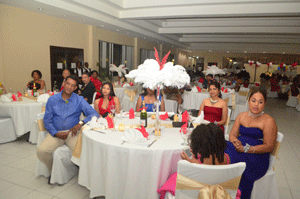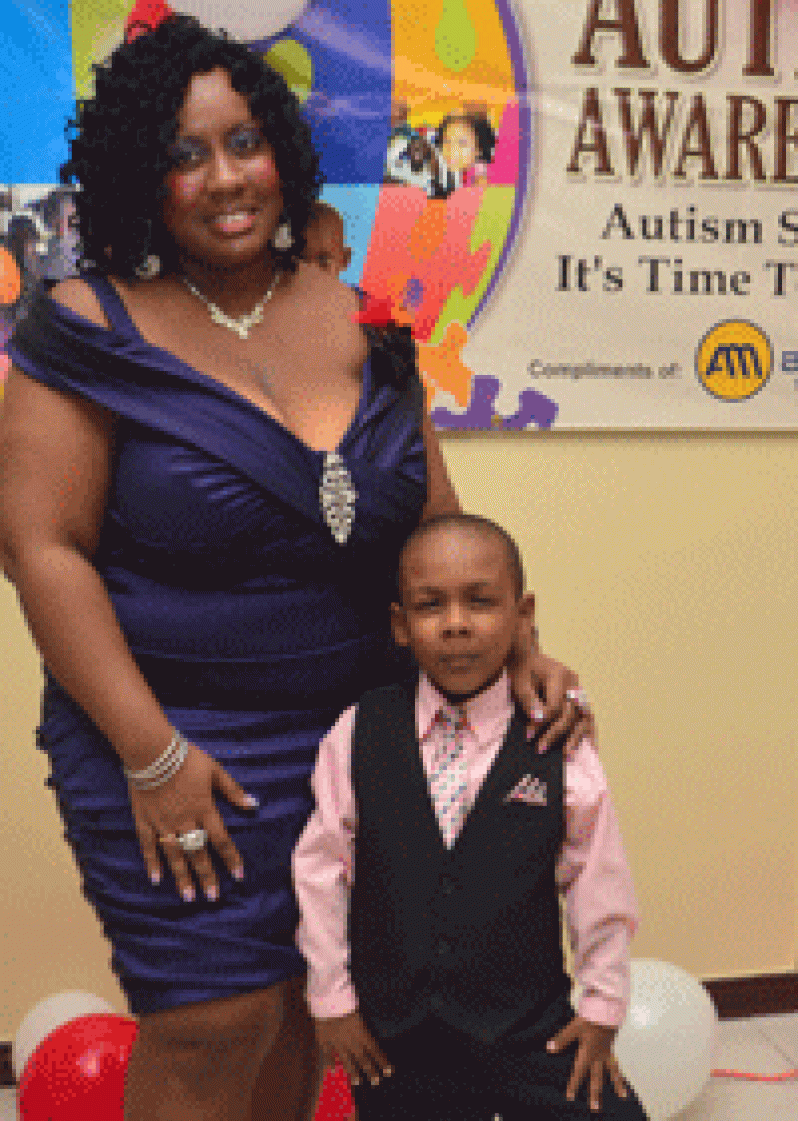— Health Minister delivers feature address
THE GUYANA Greenheart Autistic Society (GGAS) hosted its inaugural annual fund-raising dinner last Saturday at the Princess Hotel at Providence, East Bank Demerara. Health Minister Dr Bheri Ramsarran and GGAS president Ms. Karen Williams were among the distinguished patrons at the event, which also included students of the GGAS.
 As Mrs. Williams addressed the gathering and delivered her welcoming remarks, the guests were treated to various forms of entertainment: steelband music, singing, and poetry at its best.
As Mrs. Williams addressed the gathering and delivered her welcoming remarks, the guests were treated to various forms of entertainment: steelband music, singing, and poetry at its best.
Dr Ramsaran gave the feature address. He disclosed that autism is now being recognised, even though it has long been a disorder; and that the autism sector is working on recognising the different forms of autism, with active support from the Health Ministry.
He disclosed that the GGAS, located for almost two years at the Ptolemy Reid Rehabilitation Centre, has been moved to a better location on Quamina Street, Georgetown, one which had once been a doctor’s office but was out of use for quite some time. It has now been renovated, and all the useful and necessary amenities for the children have been installed.
He noted that over 20 students have so far been attending the school, and that the Health Ministry has been working tirelessly with the Ministry of Education (MoE) to improve the lives of those students.
Minister Ramsaran said that when he spoke with Education Minister Priya Manickchand, they were close to reaching an agreement to select a particular building to be renovated to become the permanent residence of the GGAS. However, he has been informed by members of the GGAS that more funds are needed for the renovation to the building, so as to provide proper classroom capacity.
In order to get the needed funds, the GGAS decided to do fundraisers such as the night’s dinner. Dr Ramsarran described this as being laudable, and encouraged that more of such events be held.
He disclosed how delighted he was with the support the GGAS has been receiving from the general public; and, in closing, noted that he recognises the contributions of doctors, especially Dr. Indira Mohabir who was present, for the work and effort they have been putting into assisting with the children’s condition.
The night’s events culminated with the guests bidding to purchase various items, such as cosmetics hampers.
The proceeds of the event will go to the trust fund of the GGAS, to ensure there is enough money to start plans for betterment of the society.
Autism Spectrum Disorder (ASD) and Autism are both general terms for a group of complex disorders of brain  development, characterized to varying degrees by difficulties in social interaction, verbal and non-verbal communication, and repetitive behaviours.
development, characterized to varying degrees by difficulties in social interaction, verbal and non-verbal communication, and repetitive behaviours.
ASD and Autism include Austistic disorder; Rett’s Syndrome (a disorder of the nervous system that leads to developmental reversals, especially in the areas of expressive language and hand use); Childhood Disintegrative Disorder (a condition in which children develop normally through ages three or four, then, over a few months, lose language, motor, social, and other skills that they already learned); pervasive developmental disorder, not otherwise specified (PDD-NOS)-another form of basic Autism; and Asperger Syndrome. (It is often considered a high-functioning form of autism. People with this syndrome have difficulty interacting socially, repeat behaviours, and are often clumsy.)
ASD can be associated with intellectual disability, difficulties in motor coordination, and attention and physical health issues such as sleep and gastrointestinal disturbances. However, some persons with ASD can excel in visual skills, math, music and art.
Children with autism often can’t make connections that other children make easily. For example, when someone smiles, you know the smiling person is happy or being friendly, but a child with Autism may have trouble connecting that smile with the person’s happy feelings. A child who has autism also has trouble linking words to their meanings.
Autism causes a child to act in very unusual ways, such as flapping their hands, saying certain words over and over, and having temper tantrums. They also don’t like changing their routines, but like to stay on one particular schedule that is always the same.
If someone has autism, his or her brain has trouble with an important job making sense with the world.
Some children can be mildly affected by autism, which means that they have very little trouble in life, and require less help, unlike those  who are highly affected and need a lot of help.
who are highly affected and need a lot of help.
Autism affects about one in every 150 children, but no one knows what causes it. Scientists believe that some children might be more likely to get autism because that or a similar disorder runs in their families. Knowing the exact cause of autism is hard, as the human brain is very complicated.
Some children with mild autism will grow up and be able to live on their own; those with more serious problems will always need some kind of help. But kids with autism have brighter futures when they have the support and understanding of doctors, teachers, caregivers, parents, brothers, sisters and friends.
Autistic Society fund-raising dinner well attended by public
SHARE THIS ARTICLE :
Facebook
Twitter
WhatsApp



.jpg)









